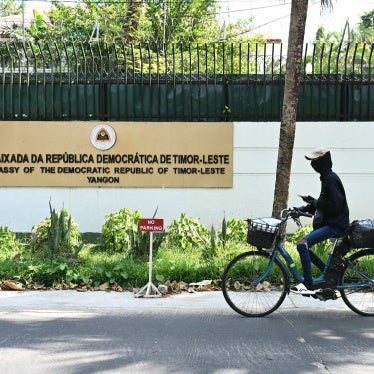To Ministers of Foreign Affairs
States Parties to the International Criminal Court
Dear Excellency,
We are writing to you in advance of the official nomination period for candidates to be elected as judges to the International Criminal Court (ICC). As you know, at its thirteenth session, the Assembly of States Parties (ASP) will elect six new judges—a third of ICC’s 18-member bench—for a period of nine years. Since the ICC’s ability to effectively try cases rests on the quality of its judges, we urge your government to ensure that only the strongest candidates are nominated and ultimately, elected.
The Rome Statute identifies several criteria to guide ICC states parties in electing judges.[1] To this end, we very much welcome the establishment by the ASP of the Advisory Committee on Nominations (ACN), which is mandated to “prepare information and analysis, of a technical character” on the qualifications of individual judicial candidates and present its analysis to states parties for consideration.[2] In our view, the ACN’s analysis of each candidate’s expertise and fluency in one of the ICC’s working languages can greatly enhance transparency around the elections process, likewise making it more likely that the best candidates are ultimately elected to the bench. We therefore urge states to given serious consideration to the ACN’s report in deciding which candidates to support in the upcoming judicial election.
At the same time, even when the Rome Statute criteria are satisfied, there is still considerable leeway in determining which individuals are best suited to serve as ICC judges. Our close observation of the court’s functioning since it began operations has highlighted the importance of electing judges who possess substantial practical experience in criminal trials and who can meet the many demands associated with adjudicating complex and time-intensive cases. We believe that candidates who possess these qualities, in addition to satisfying the Rome Statute criteria, will be best equipped to meet the challenges ahead.
Substantial practical experience in criminal trials
The upcoming election comes at a critical time of the court’s functioning. Pre-trial or trial proceedings have intensified over the last several years, with trial proceedings in five cases and appeals proceedings in two cases. The court also maintains an active pre-trial docket in at least three of the court’s eight country situations under investigation, and there are hundreds of victims participating in proceedings before the court. Managing these proceedings effectively—meaning pre-trial and trial proceedings that run efficiently while respecting the rights of defendants—requires judges familiar with the demands of criminal trials.
Based on the Rome Statute’s Minimum Voting Requirements, states parties must elect at least two “List B” judges, that is, those with established competence in relevant international law, in the upcoming election.[3]As a result, there remain four open slots that could be filled by either “List A” judges, meaning those with established competence in criminal law, or “List B” judges. Human Rights Watch believes that states parties should prioritize nominating “List A” candidates to fill the four open slots since judges with previous experience in criminal law and procedure will be best placed to meet the demands of ICC proceedings as outlined above. Increasing the number of strong “List A” nominees for the ASP’s consideration in turn increases the likelihood that more “List A” candidates will be elected to fill the four open slots.
The capacity and willingness to meet the demands of adjudicating cases over a nine-year term
As Judge Song mentioned in his address to the twelfth session of the ICC’s ASP, it is essential that states put forward candidates who are in good health.[4] States parties should only put forward candidates who possess the capacity (including stamina) and motivation to manage the often complex and time-consuming tasks associated with pre-trial and trial proceedings—including determining the fate of potentially hundreds of applications of victims who want to participate in situations and cases and managing the complex system of disclosure of evidence to the defense—over a full nine-year term of office. Moreover, as cases before the ICC proliferate, judges may be required to sit on more than one case at a time, resulting in an increased workload.[5] States parties should therefore understand that judicial staffing resources are quite limited, and candidates will have to shoulder the ever-increasing demands on judges as demands on the ICC also increase.
We hope these suggestions will assist your government in the nomination phase and ultimately, in determining which candidates should be elected to serve as ICC judges.
Please do not hesitate to be in touch should you have any further questions.
Sincerely,
Richard Dicker
Director, International Justice Program
Human Rights Watch
[1]Article 36(3) provides that “judges shall be chosen from among persons of high moral character, impartiality and integrity who possess the qualifications required in their respective States for appointment to the highest judicial offices.” Every candidate for election as an ICC judge must have established competence either in criminal law and procedure (known as “List A” candidates) or relevant areas of international law (known as “List B” candidates) and must be fluent in at least one of the ICC’s working languages. In addition, states parties should take into account the requirements enumerated in article 36(8) as to gender, geography, and type of legal system represented, bearing in mind the need to include judges with specific legal expertise on issues including violence against women and children.
[2]ASP, Report of the Bureau on the establishment of an Advisory Committee on nominations of judges of
the International Criminal Court, November 30, 2011, http://www.icc-cpi.int/iccdocs/asp_docs/ASP10/ICC-ASP-10-36-ENG.pdf (accessed March 21, 2014) at p. 4.
[3]ASP Secretariat, Note verbale, ICC-ASP/13/SP/06m, February 18, 2014 at p. 11.
[4]Judge Sang-Hyun Song, Statement at the opening of the 12th Session of the ASP, http://www.icc-cpi.int/iccdocs/asp_docs/ASP12/ASP12-OP-Statement-ICCPRE-... (accessed March 21, 2014) at p. 2.
[5]For instance, outgoing Judge Hans-Peter Kaul served on both Pre-Trial Chambers I and II.








